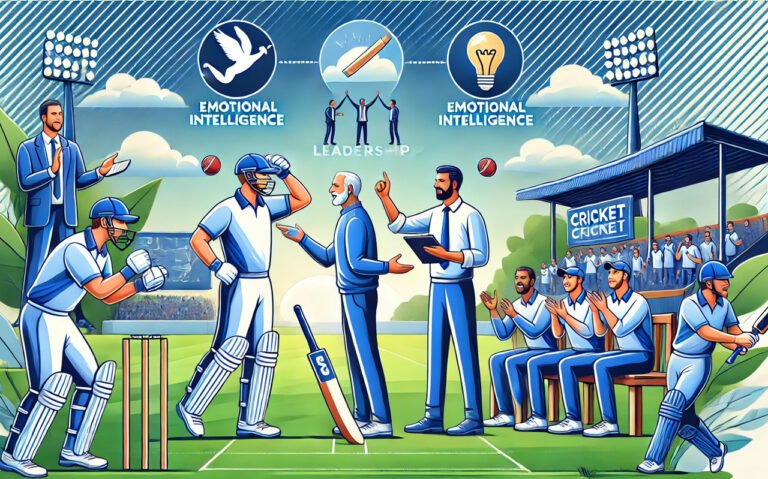The Role of Cricket Soft Skills: Lessons from Iconic Cricketers
Introduction
Cricket is not just a game of bat and ball; it’s a test of mental fortitude, leadership, and emotional intelligence. While physical abilities and technical skills play a significant role, soft skills often determine success on the field. From decision-making under pressure to effective communication, soft skills are essential for players to thrive in this competitive sport.
In this article, we’ll explore the importance of soft skills in cricket, backed by iconic examples of legendary cricketers who have demonstrated these qualities.
What Are Soft Skills in Cricket?
Soft skills refer to personal attributes that enable individuals to interact effectively with others. In the cricketing world, these include:
- Leadership and Team Management
- Communication and Collaboration
- Emotional Intelligence
- Decision-Making Under Pressure
- Adaptability and Resilience
- Sportsmanship and Integrity
These skills are as critical as mastering batting, bowling, or fielding. Successful cricketers often excel because of their ability to harness these attributes on and off the field.
1. Leadership and Team Management
Example: MS Dhoni
MS Dhoni, one of the most successful cricket captains, is renowned for his calm demeanor and exceptional leadership. His ability to stay composed under pressure has led India to numerous victories, including the 2007 T20 World Cup and the 2011 ICC Cricket World Cup.
Leadership Takeaway:
- Effective leaders inspire confidence and bring out the best in their teammates.
- Decision-making during crucial moments can change the course of a game.
Keyword Focus: MS Dhoni leadership, cricket team management, cricket captain soft skills.
2. Communication and Collaboration
Example: Ricky Ponting
Ricky Ponting’s exceptional communication skills played a vital role in leading Australia to multiple World Cup titles. His ability to maintain clear communication with teammates and adapt to game situations set him apart.
Communication Takeaway:
- Clear and effective communication fosters team synergy.
- Collaboration ensures better on-field decision-making.
Keyword Focus: Ricky Ponting captaincy, teamwork in cricket, effective communication in sports.
3. Emotional Intelligence
Example: Virat Kohli
Virat Kohli’s emotional intelligence is evident in how he motivates his team and handles challenging situations. His passion and empathy contribute to a positive team environment, allowing players to perform at their best.
Emotional Intelligence Takeaway:
- Understanding and managing emotions is key to maintaining focus.
- A leader with emotional intelligence can inspire and unite the team.
Keyword Focus: Emotional intelligence in cricket, Virat Kohli leadership, mental strength in sports.
4. Decision-Making Under Pressure
Example: Ben Stokes
Ben Stokes’ match-winning performance in the 2019 ICC Cricket World Cup Final is a testament to his decision-making ability. Facing intense pressure, Stokes remained calm and made calculated decisions that led England to victory.
Decision-Making Takeaway:
- Quick thinking and composure in high-pressure scenarios are invaluable.
- Effective decision-making often differentiates good players from great players.
Keyword Focus: Ben Stokes World Cup, cricket decision making, pressure management in sports.
5. Adaptability and Resilience
Example: Sachin Tendulkar
Sachin Tendulkar’s career spanned over two decades, during which he faced various challenges. His ability to adapt his playing style and recover from injuries demonstrated remarkable resilience.
Adaptability Takeaway:
- Adaptability ensures longevity and consistent performance.
- Resilience enables athletes to bounce back from setbacks.
Keyword Focus: Sachin Tendulkar resilience, adaptability in cricket, overcoming challenges in sports.
6. Sportsmanship and Integrity
Example: Rahul Dravid
Known as “The Wall,” Rahul Dravid exemplifies sportsmanship and fair play. His respect for opponents and commitment to the spirit of the game has earned him immense admiration.
Sportsmanship Takeaway:
- Integrity and respect for the game enhance a player’s reputation.
- Upholding ethical values builds credibility on and off the field.
Keyword Focus: Rahul Dravid sportsmanship, cricket ethics, integrity in sports.
Why Soft Skills Are Essential for Cricketers
- Building Team Cohesion: Strong interpersonal skills promote unity and cooperation.
- Managing Stress: Emotional resilience helps players stay focused during critical moments.
- Strategic Thinking: Analytical skills enable players to assess opponents’ strategies.
- Mentorship and Growth: Senior players with excellent leadership skills mentor emerging talent.
- Global Representation: Effective communicators represent their teams and countries positively.
Keyword Focus: Importance of soft skills in cricket, cricket team dynamics, sports psychology.
Developing Soft Skills as a Cricketer
To develop soft skills, cricketers can:
- Engage in Leadership Training: Participating in mentorship programs.
- Practice Mindfulness: Enhancing emotional intelligence and resilience.
- Improve Communication: Actively listening and providing constructive feedback.
- Simulate High-Pressure Scenarios: Practicing decision-making in practice sessions.
Keyword Focus: Soft skill development in sports, cricket training programs, sports leadership tips.
Conclusion
Cricket is a game of strategy, resilience, and teamwork, where soft skills often separate good players from legends. As demonstrated by iconic cricketers like MS Dhoni, Virat Kohli, and Sachin Tendulkar, leadership, emotional intelligence, and adaptability are invaluable both on and off the field.
Aspiring cricketers and professionals alike can benefit from cultivating these skills to enhance their performance and navigate challenges successfully. By focusing on soft skill development, they can achieve sustained success and make a lasting impact on the cricketing world.
Keyword Focus: Cricket leadership lessons, cricket soft skills training, sports management tips.
FAQs on Soft Skills in Cricket
- What are the essential soft skills for cricketers?
Cricketers need leadership, communication, emotional intelligence, decision-making abilities, adaptability, and sportsmanship. - Why is emotional intelligence important in cricket?
Emotional intelligence helps players manage stress, stay calm under pressure, and build stronger team relationships. - How can a cricketer develop soft skills?
By engaging in leadership training, practicing communication exercises, and learning from experienced mentors. - Which cricketer is known for their leadership skills?
MS Dhoni is widely praised for his calm and effective leadership in high-pressure situations. - What role does decision-making play in cricket?
Quick and accurate decision-making can determine the outcome of critical moments in a match.


